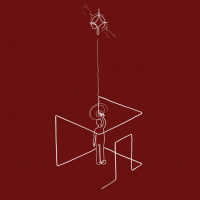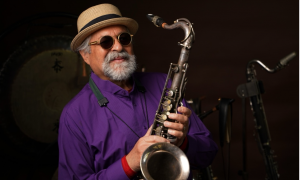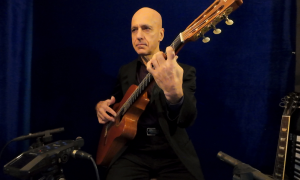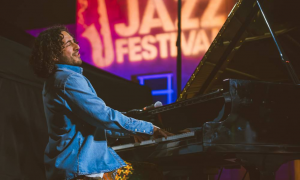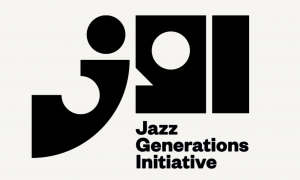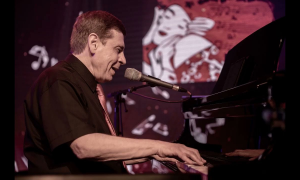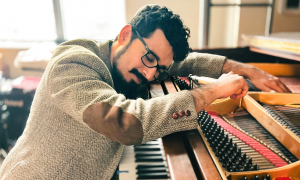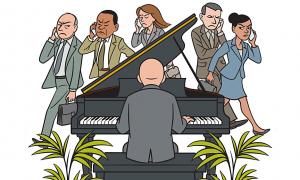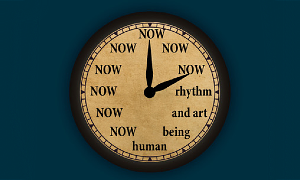 |
Two of England's finest art rock ensembles, Yes and Asia, begin a North American tour that will run through August. Tonight they perform at the Fantasy Springs Resort Casino in Indio, CA, followed by a performance at the Thomas and Mack Center in Las Vegas on Saturday night. Last year Yes celebrated their 40th anniversary and the original lineup of Asia reunited in 2007 to celebrate their 25th anniversary. Just by the numbers, it's clear these are veterans that disprove the idea that rock is purely a young man's game. And though often uncredited, both bands, particularly Yes, are part of the primordial soup that produced the jam culture of Phish, moe., Umphrey's McGee and many others, providing a blueprint for combining stratospheric musicianship, complex composition and populist angling with rock's more remedial pleasures.
JamBase was fortunate to speak with some of the principles involved with a tour that will see guitarist Steve Howe doing double duty in what promises to be some of the more high end melodic rock on the summer circuit. While Yes' lead singer Jon Anderson has been sidelined for health reasons - surprisingly ably understudied by fresh find Benoit David (though no one this side of Middle Earth really sounds like Anderson) - Asia will feature all four original members - Howe, King Crimson vet John Wetton (bass, lead vocals), Geoff Downes (keys) and drum god Carl Palmer of Emerson, Lake & Palmer fame.
Drummer Alan White was already a respected session player in the British rock scene when he was invited to join Yes in 1972. He'd played on the Plastic Ono Band's Live Peace In Toronto, George Harrison's All Things Must Pass and John Lennon's Imagine. It's his gutsy swing you hear on “Instant Karma," a potent percussion voice that reverberates right through the Yes catalog to this day, putting heft crisp snare pop to classics like “Owner of a Lonely Heart." In a band with a head-scratching amount of membership turnover, White, along with bassist Chris Squire, has remained a constant since his induction. He's the one guy who still gets along with the vast majority of their alumni, and he's definitely the least prone to showing off his technique. White is pure class and pure chops, a drummer's drummer, and we were chuffed to get a few minutes with the man.
JamBase: One hears the phrase, “Give the drummer some," but you're usually the last guys to get press. Given your stellar work in Yes over the years, I wanted an opportunity to put a spotlight on your contribution to the band.
 |
Alan White: It is a different perspective, but it's pretty much a democratic band. Everyone is equally talented in everything they do in their individual instruments. At least we approach it that way.
JamBase: The energy in Yes can get really wild and yet there's your presence in the back to keep things anchored.
Alan White: Well, it needs it sometimes [laughs]. It's good because you can keep things from becoming a racket, but at the same time I can be as active as the rest of them. Sometimes they just need a firm crutch to lean on.
That balance of elements is one of the things that's long caught my ear in Yes. As big and dynamic as you can be at times, there's a solidity to it.
I think that's something the band has built up. You listen to the first albums and the band could be quite flighty back then. I think the band wanted to get more of a foot on the ground, not be as flighty and twiddly with notes everywhere. It now has some kind of solidarity to it, always moving the music forward with our eye on something holding it all together.
You have to keep track of a lot of tempo changes in Yes.
That's the one thing I kind of taught myself as I was drawn into Yes in my teens, as it were. I started with The Beatles and the Stones and all that and then moved into jazz-fusion and a very diverse variety of music, which I then tried to adapt, keeping some solidarity to the rhythm but also being able to play 5/4 and 9/4 time signatures. And also playing so people feel they can dance to it; so really, really making it swing extra good so it feels as if they're listening to normal music.
If you go to a Yes show you'll see people moving a good deal even though on the surface this doesn't seem like dance music at all.
 |
Yes, exactly! We want you to feel you can tap your foot to it. And people can dance to it but they might stumble around a bit sometimes [laughs]. It's like, “This one's in 5/4 but it sounds like it's in 4/4." So, if you trip up it's because of that extra beat.
It's the sense of play in this band that's brought me back year after year. It's very high-level musicianship but you still seem to have a lot of fun together.
A lot of people think when they go to a Yes concert they're seeing a show that's absolutely, ridiculously worked out, which a lot of it is, but you'd be surprised at how much improvisation we do. There's a lot of improvisation amongst the organization.
You couldn't be careless with this music though. It seems hard to be too improvisational in places given the complexity of many compositions.
Some things certainly have to be the same because, believe you me, if anyone gets anything wrong then the whole thing falls like dominoes. You have to play the organized parts absolutely spot-on.
The audience has expectations and if certain pieces, say “Yours Is No Disgrace," don't hit their marks exactly they're disappointed.
And that's one of the easiest ones we play! I think we could all read a book and play that one.
The longer this band goes on, the more attached fans become to what they regard as the “classic" material. That presents a challenge in getting across new material, but Yes has kept on making records, actively resisting beings a “hits" band.
 |
Obviously, I love playing the classic stuff we did but personally, I enjoy a lot of the newer stuff, including 90125, of course, which everybody loves to hear. But when you get to albums like Magnification [2001] and The Ladder [1999], they've got some very, very interesting things on them. I think Talk is the most under-estimated album we've made. There's some really incredible playing on there.
You're all very engaged, creatively, on this newer material. It's not as if you're putting out “product" to tour behind.
Exactly! No, no, no. We move together and we move how we all feel. It's the way we move forward and approach new things with each other. We have an idea and we take it to a person, who then has an idea and takes it to another person, and all of the sudden we come up with Yes Music.
That's a phrase you all seem to use. It came up the first time I spoke with Jon Anderson [see our 2004 feature here]. It's not strictly rock; there are elements of classical, fusion, jazz, etc. So, you just have to give it that general heading don't you?
It's the kind of thing where there's not many “clone" Yes bands [laughs]. A lot of it is very, very difficult. There's a tribute band in Sacramento called Parallels, and they're actually damn good and they play some pretty diverse music. When all of us [in Yes] come together it just has this natural sparkle.
When I first encountered Yes as a young man you all seemed vaguely superhuman to me as musicians, and that feeling remains to a lesser extent to this day. It just seems like a form of magic what you do. You even had a keyboard player for many years [Rick Wakeman] who wore sparkly capes!
Rick has been in and out and in and out. This time we're out with Rick's son Oliver, and he plays pretty much exactly like Rick but he's 25 years younger! He plays with Ozzy, too. He's a professional guy.
Is it somewhat daunting to realize you've just celebrated Yes' 40th anniversary?
I really don't feel like that. As far as energy levels and all that goes, I'm ready to go another 10 or 15 years.
In the late '70s Rick Wakeman did a cartoon that we put in the program, and it's our manager Brian Lane with the whole band in a meeting telling us that when we next go out on tour we're not going to make any money. And that was the opening ploy. By the end we're on stage and Jon's in a wheelchair and Chris is on crutches and I've got some nurse holding me up. It's a bizarre cartoon, and that's what we thought in the late '70s!
I think we're being asked to come to terms with musicians who began their careers in the '60s and '70s who have no intention of giving any ground they don't have to as they grow older.
Jagger still moves around like he's a little boy. What's the guy, 64 or 65? It's kind of strange how we can just keep on going.
Continue reading for our conversation with Asia's Geoff Downes...
 |
Regardless of his soundtrack work, healthy stack of solo releases and dozens of albums under the Asia banner, Geoff Downes may be best known for being part of The Buggles with future producer extraordinaire Trevor Horn. Their 1979 single “Video Killed The Radio Star" is famous/infamous for being the first video aired on MTV in 1981. Since that glossy bit o' nihilism, Downes has been an active and prolific keyboardist and producer, working with his bands and the likes of Kate Bush and Mike Oldfield. He has been the torchbearer for Asia, keeping things going pretty much continuously since the group's inception with various lineups. 27 years on it's easy to forget that Asia was a massive success out of the gate, with their self-titled debut going quadruple platinum and producing two Top 10 singles with “Heat of the Moment" and “Only Time Will Tell" - songs that crop up endlessly in TV and film to this day. The follow-up, Alpha (1983), also went platinum but proved the end of the original configuration. Downes took time to talk to us about playing with his mates again and the chance to take care of some unfinished business.
JamBase: It's cool that the original lineup is revisiting Asia again. It always seemed like a good time for all of you.
Geoff Downes: I think it was a release for a lot of the guys, who had been in sort of heavier bands, you know progressive rock, pompous bands, I think Asia cut that all down a bit. It was a bit more of a pop-rock band really.
JamBase: My sense from the beginning was you guys were just digging in to see what you could accomplish in the pop world. You'd already had some experience with that world but the rest of the band wasn't known for writing ditties.
Geoff Downes: I think that was one of the reasons they warmed to having me involved, to balance their kind of stuff. We formed a hybrid combination. When you look at Asia it's all very different personalities that came together, and that's the beauty of the sound really. It makes it quite unique.
And you'd had some experience with Steve Howe before this band.
I did one album with Yes, Drama [1980]. That was rather funny, a big shift for me. Trevor [Horn] and I were very big fans of Yes and bands like them. We were kind of steeped in that music. I think Yes fans were quite divided at the time, but it's stood the test of time and now sounds quite fresh and modern.
What was the impetus to get the original lineup of Asia back together?
 |
We'd all kept socializing, and we made the decision a few years ago. When we ended we were uncomfortable where it was going but all felt there was still something left to achieve, something we set out to achieve 25 years ago. So, a case of unfinished business, I think. And then everyone was available and everyone wanted to do it. It started out as a touring idea and then the ideas for Phoenix [Asia's 2008 studio album] started permeating through.
What was some of the “unfinished business" that you wanted to get to?
We only did two albums and only really did two tours. So, it was a new band but we'd all had experiences in other bands, so the “super group" moniker got attached. We all felt that we'd not really explored all the possibilities and avenues. So, the opportunity to do another album, even 25 years later, is something we all grabbed with both hands.
Chemistry is not to be sneezed at. When you have people you like to collaborate with it's attractive to revisit that creative connection.
There was something good about what we were doing, and we all felt we wanted a bit more of it. As soon as we got rehearsing for the [first reunion] tour it was quite evident that the Asia vibe was still there.
There's something pure about the basic configuration of four guys in a rock band, too - a classic model.
We wanted to maintain the musical aspects of the group and the individuals. As you point out, you've got bass, drums, guitar and keyboards - the four kind of main elements of a band - and John's vocals and Steve and my backing vocals. So, we had quite a set and kind of a defining band, which is part of why we opted for the name Asia with that impactive logo.
Do you play non-Asia material on tour now, dipping into the individual member's varied histories? This seems like an enjoyable way to revisit the past in a new light.
 |
Yeah, it's actually a great deal of fun. We positively shied away from it in the early days, as we were so conscious of establishing Asia. We were wary to have anything connected to our respective past. 25 years on, we can see that Asia was actually formed from the DNA of all these other bands, so we honor that tradition as well. And played by the four guys, it sits quite well next to the Asia material.
We do “Video Killed The Radio Star," which is a tribute to my past, which is quite significant to Asia because when we first came out MTV and videos were just gaining some significance. We established ourselves on MTV early on. Now, we show video and projections and some people say, “Why do you do that?" Well, it's like looking through an old family photo album. The whole thing about Asia is it has a relevant history. There's not many bands that can go out and do what we do, do something from each guy's past and still have it seem appropriate.
And these songs have a different character that's still Asia even if we know the tunes originally by another band.
We do try to put our stamp on things. When we do “Roundabout" Steve says, “Well, that was 'Roundabout' played by four people not five." It shows a slightly different angle on the piece. I'm quite a different player [than Rick Wakeman] but I learned a lot from Rick and Keith Emerson. They were people I looked up to when I was at school. I'm five or six years younger than those two, and they were very much the kind of thing I wanted to do. It was quite ironic when I ended up in Yes and then I'm working with Carl in Asia, so that's kind of weird.
Continue reading for our conversation with Carl Palmer...
 |
JamBase: I think Emerson, Lake & Palmer's album covers were some of my first truly psychedelic experiences as a teen when I began experimenting with weed.
Carl Palmer: Well, we've all gone through that, haven't we? [laughs]
JamBase: One can hope. It's neat to see you back with Asia. It seemed a project where all four guys were really having a blast.
Carl Palmer: The first year it was a lot of fun, the second year it went sour quickly personality-wise. So, that's why we stopped it even though we had colossal success commercially, being No. 1 [on album charts] for nine weeks, as well as a top single for seven consecutive weeks. We've been back together for about three years now, and we decided to come back basically for the 25th anniversary. We've toured Japan, Europe and America several times and it's very easy and we're able to keep our own individual personalities. I've got my own band and [Asia] can run alongside whatever else we're doing and still do enough work for it to be serious, which we are about it.
This is a pretty serious group just in terms of the musicianship. You four collectively have more chops than most groups out there.
We have quite a thoroughbred history attached to the band. That's nice, but it can be a hindrance at times. The fact that the group had such success as an entity on its own is a nice thing to be attached to. So, we do draw from the past; we play music from ELP, King Crimson and The Buggles, that hit that they had with the video on TV in the U.S. We couldn't have done that when we started because it would have looked like a weakness; now it looks like a strength. We're all very happy with that.
Prior to Asia's debut in 1982, there'd been some pop success in your other projects but nothing specifically designed to be pop music except for Geoff's work in The Buggles. Asia struck me as you guys trying your hand in that realm.
The first album, to be honest with you, I consider one of the best albums I've made in terms of balance. I find that the first Asia album did have the prog rock influence in things like “Time Again" and “Cutting It Fine." “Wildest Dreams" is also on the proggy side. There was more than “Only Time Will Tell" and “Heat of the Moment," the pop stuff. We never achieved that again, we went too poppy, which was a mistake. The new album, Phoenix, is a lot more somber - beautiful melodies, well orchestrated and the playing doesn't have anyone show off unnecessarily. It's in its own category of where we are today. It's quite an honest musical picture of what the band's all about as we speak. When you put all those influences and ingredients together it's a nice show. The band is well balanced now, which is much nicer than it was before.
For you, as a drummer, what does this project bring you that's different than that wide open landscape you had in Emerson, Lake & Palmer and some of the more compositional stuff you do in your own band?
 |
This is a lot more restrictive from the point of view of having to play to the song. I'm involved with a lot more instrumental music now with my own band. This music with Asia, I've sort of grown up with it, in a way. I was 30 when the band started and I'm 58 now, so there's a lot of attachment to it over the years. We've always stayed very friendly with each other - England's a very small space. For me, it's about having fun. I don't take it over-seriously; I just play it. It's just a nice alternative to be part of it, because the classical, instrumental prog rock that I am part of quite seriously in Europe - Germany, Austria, places like that where I play all the time with my group - that's a full-on musical expression. It takes up a lot of time and it's incredibly energetic and extremely hard work, and this is kind of easy. It's not that I don't take it seriously but they're radio friendly songs. They were very adult in their approach on Phoenix, so it's a much calmer existence. It's nice to have light and shade.
That's something one picks up on as a listener with Asia. It isn't as exhaustingly taxing as some of the other music you're all involved in [laughs].
We take an intermission now. We play for about an hour and 15 minutes, and then take a 15-minute break before coming back for another hour or so, and it seems to work out well. I can't say it's easy listening but it's on the commercial side. There are as many women in the audience as there are guys. At my concerts, for example, all you'll find is rangy guys. This goes across the board, female and male. It's the same demographic as we are - forties to sixties - and some of them are bringing their kids, which is nice. It is open to the female side of life, which makes it different as well. That's the way it is so I have fun with it.
I would be remiss if I didn't ask you about the chances for an Emerson, Lake & Palmer reunion. There's a faction in the States that would love to see another big U.S. tour.
 |
All I can say to them is, “Not this week." I can't deny that Emerson, Lake & Palmer has been a major part of my life, and we're still all heavily involved in the band because we own all our recordings and publishing. We have various distribution deals around the world and we're involved with any remastering and bits and pieces like that. So, all in all, we are together but there are no plans to play or record or do anything. But you never know, do you? How long is a piece of string? No one would have thought Asia would come back together after 23 years.
I'll be very, very honest with you and say I'm in no rush to do Emerson, Lake & Palmer again. Nothing against the music, I play a lot of classical adaptations that weren't written by ELP in my own band, and I play some original pieces I wrote with my own band. I'm still very fond of the music. I'm still deeply attached to it, and the instrumental side of Emerson, Lake & Palmer is obviously very dear to me. I've carried on that, but as far as getting the three of us back together to play, it's not something that's on anyone's agenda BUT it's not something that couldn't be.
If we were to reform - which would be the third time, incidentally - the only thing that I really have to bring the hammer down on is I personally work with some really great, young musicians and they're FANTASTIC players. So, as long as everybody was up to speed and prepared to give it their all, including the same theatrical and production input, then obviously anything can happen. It's bad when you start to water down what you used to be or what you used to do. I don't like to see that for bands - and I'm not saying for one minute that Emerson, Lake & Palmer would do that - but it would have to be at least where we finished off and then we'd have to move the bar upwards again.
The ELP question was more out of general curiosity than a personal desire to see you on stage again with Greg and Keith. I'm always most interested and engaged when it's clear the musicians are reveling in their creation together, and sometimes that's not with the band that made them famous as time goes by.
To be honest with you, I started my band because the music is still very, very important to me. I couldn't go out and play like Emerson, Lake & Palmer because I'm only the Palmer in ELP. I don't want to be copying it. It's one of the reasons I have a guitar player and not a keyboard player. I want to be setting another standard in another area. To be honest, years ago if we could have had a guitar player that could have joined Emerson, Lake & Palmer and played the stuff we wanted him to play, say like the chap I have in my band [Paul Bielatowicz], then we would have had them, but the standard was just not that high then. So, this is just something that I would have had years ago that I can do in my own band. I can use a guitar player but I wouldn't use a keyboard player; that'd be so silly. This way it's fresh and a way to be original in the classical adaptations that I really am fond of. They mean a lot to me - I am a European. I love taking this music into the rock environment.
I've even recorded a whole version of Pictures at an Exhibition. I've taken the songs out and stayed more true to Mussorgsky's arrangements, but it's done as a power classical rock trio, and I've recorded that live. All of my [Carl Palmer Band] albums have been recorded live so far, because of my agreement with the company. I'm very close to that music, so to say if Emerson, Lake & Palmer would ever come back in their natural form as it was years ago, well, I'm always open to anything like that because I'm still deeply involved with it anyway. The music means a lot to me, and the same with Asia - that's why I do it.
Yes and Asia are on tour now, dates available here.






